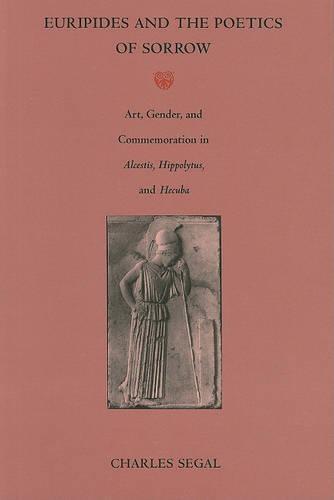Overview
Where is the pleasure in tragedy? This question, how suffering and sorrow become the stuff of aesthetic delight, is at the center of Charles Segal's new book, which collects and expands his recent explorations of Euripides' art. Alcestis, Hippolytus, and Hecuba, the three early plays interpreted here, are linked by common themes of violence, death, lamentation and mourning, and by their implicit definitions of male and female roles. Segal shows how these plays draw on ancient traditions of poetic and ritual commemoration, particularly epic song, and at the same time refashion these traditions into new forms. In place of the epic muse of martial glory, Euripides, Segal argues, evokes a muse of sorrows who transforms the suffering of individuals into a ""common grief for all the citizens,"" a community of shared feeling in the theater. Like his predecessors in tragedy, Euripides believes death, more than any other event, exposes the deepest truth of human nature. Segal examines the revealing final moments in Alcestis, Hippolytus, and Hecuba, and discusses the playwright's use of these deaths--especially those of women--to question traditional values and the familiar definitions of male heroism. Focusing on gender, the affective dimension of tragedy, and ritual mourning and commemoration, Segal develops and extends his earlier work on Greek drama. The result deepens our understanding of Euripides' art and of tragedy itself.
Full Product Details
Author: Charles Segal
Publisher: Duke University Press
Imprint: Duke University Press
Dimensions:
Width: 15.50cm
, Height: 2.50cm
, Length: 23.10cm
Weight: 0.676kg
ISBN: 9780822313601
ISBN 10: 082231360
Pages: 328
Publication Date: 19 October 1993
Audience:
College/higher education
,
Professional and scholarly
,
General/trade
,
Undergraduate
,
Postgraduate, Research & Scholarly
Format: Hardback
Publisher's Status: Out of Print
Availability: In Print 
Limited stock is available. It will be ordered for you and shipped pending supplier's limited stock.
Table of Contents
Preface ix 1. Introduction 3 2. Europides' Muse of Sorrows and the Artifice of Tragic Pleasure 13 Alcestis 3. Cold Delight: Art, Death, and Transgression of Genre 37 4. Female Death and Male Tears 51 5. Admetus' Divided House: Spatial Dichotomies and Gender Roles 73 Hippolytus 6. Language, Signs, and Gender 89 7. Theater, Ritual, and Commemoration 110 8. Confusion and Concealment: Vision, Hope, and Tragic Knowledge 136 Hecuba 9. Golden Armor and Servile Robes: Heroism and Metamorphosis 157 10. Violence and the Other: Greek, Female, and Barbarian 170 11. Law and Universals 191 12. The Problem of the Gods 214 13. Conclusion: Euripides' Songs of Sorrow 227 Notes 237 Bibliography 283 Index 303
Reviews
Several interconnected themes unify this book. One is Euripides's mixture of 'mythic' elements with 'realistic' and ratiocinative ones, which produces new forms of tragic discourse. Another is Euripides's deconstruction of such comfortable oppositions as male/female and Greek/barbarian, which dissolves the barriers between actor and audience, self and 'other.' Segal develops his argument with great lucidity, patient reference to the text, broad and informed acknowledgment of the work of others, and an admirable ability to make connections between literary apercus and the history of ideas. -Peter Burian, Duke University The essays are uniformly first rate; they advance the understanding of the plays in detail and in overall perspective; and they address deep, complex questions with a critical sophistication that, for this age, shows itself to be remarkably lucid and sane. I was delighted to learn new things about plays I knew very well, and to reexamine them in a new light. -Kenneth J. Reckford, University of North Carolina
The essays are uniformly first rate; they advance the understanding of the plays in detail and in overall perspective; and they address deep, complex questions with a critical sophistication that, for this age, shows itself to be remarkably lucid and sane. I was delighted to learn new things about plays I knew very well, and to reexamine them in a new light. --Kenneth J. Reckford, University of North Carolina
Author Information
Charles Segal is Professor of Greek and Latin at Harvard University. He is the author of numerous books, including Lucretius on Death and Anxiety, Orpheus: The Myth of the Poet, and Interpreting Greek Tragedy: Myth, Poetry, Text.
Tab Content 6
Author Website:
Countries Available
All regions
|



